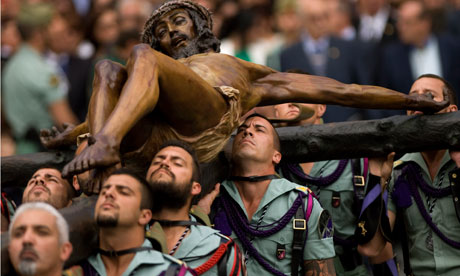Part 1: civil religion and the state
The 'God' of American civil religion supplies a way for society to judge itself from a standpoint exterior to power
The recent death of Robert Bellah made me reread his classic essay on American civil religion, which first appeared in 1967 and this, in turn, sparked a series' worth of questions on what religion is. Bellah believed, as I have come to do, that a society without religion is impossible. This claim will strike quite a lot of readers as wholly absurd, as ridiculous as supposing that Earth goes round the sun when any fool can see the sun crossing the heavens several times at least in any English summer. So I think it's worth examining and defending at some length.
The first requirement, if you are going to do this, is to break all notions of religion as being something essentially like Christianity or any of the other monotheisms of today. To talk about "religion" as if the perfect form was modern Christianity is like talking about biology as if the perfect mammal was homo sapiens.
Bellah was a sociologist and to some extent an anthropologist too. He knew very well that there have been innumerable different forms of religion, and that counter-examples can be found for everything that is supposed to be distinctively religious. You don't need priests, holy books, or doctrines. You don't even need myths. All these are things which, once established, are hard to be rid of, because they reflect and help to constitute increasingly complex models of social organisation which will tend to replace more simple ones. But none of them are essential to a religion.
At the same time, it's important not to go too far in the other direction, and to suppose that every social activity, and every movement of the inner life, can be described as in some sense religious.
Bellah himself started off in the 70s with a long and complicated definition and ended up with a very simple and powerful one. This came in part from the early 20th-century philosopher George Santayana, who wrote that having a religion meant having "another world to live in – whether we expect ever to pass wholly over into it or not".
What Bellah added to this was the point that the world of everyday, from which religion promises to deliver us, is not more real, or less constructed than the one we access through religious practices. Everyday life may involve different kinds of cognition, but the world we see through its mechanisms is just as much the product of wish fulfilment as heaven might be. Only the appetites being satisfied in there are different.
And living entirely in the daily life world of those narrow appetites and immediate problems to solve is literally intolerable. No one can manage it all the time. He doesn't mean by this that religion speaks to our higher or more unselfish instincts. It needs to be taken for granted in these arguments that some forms of religion are almost entirely malign and lead to horror. But religion is also, importantly, selfless. Its atrocities derive from a higher cause. They offer the hope that things will be different.
How does this map on to his idea of an American civic religion, distinct from Christianity? Perhaps the most important point of his essay, easily overlooked, is that there has been from the very beginning of the Republic, he says, an American civil irreligion competing with the civil religion as a narrative and a general theory of the state and its people. Again, it is a characteristic of this thought that there are struggles rather than simplicities.
The struggle between civil religion and civil irreligion is also one between republicanism and liberalism as these were understood in the late 18th century. Republicanism, certainly as it was understood in the 18th century, depends utterly on religion, because a republic is built and maintained by its citizens in their interactions with each other. They have to subordinate themselves quite deliberately to a vision of a common good, and they must see this as fulfilling their own natures. That, very simply, is the task of religion. This is the spirit that he sees infuses the Declaration of Independence.
Against this is the competing tradition of liberalism, more fully developed in the constitution. Liberalism (in this sense) has no need of God because it trusts that the self-interest of the citizens will lead them to the best possible outcome: "the state is a purely neutral legal mechanism without purposes or values. Its sole function is to protect the rights of individuals, that is, to protect freedom." Such a state is, he thinks, an absurd impossibility, which could never exist (non-existence does not of course much diminish its power over our imaginations).
States and societies must have a way to judge themselves from some standpoint exterior to power. It is not enough for religion to give us access to another world: we must be able to contemplate our everyday world and judge it by the standards of the one we reach. And this judgment is what the "God" of American civil religion supplies. This God is clearly distinct from the Christian one, and still more the Jewish one. Rather he is the being who rescues, or who might sometimes rescue, America from the evil angels of its nature.
Whatever else you think of his ideas, this task is pressing today.
------
Part 2: why football doesn't measure up
The most blinding and obvious deficiency of football as a religion is that it lacks any kind of theology – and excludes many women

'For a lot of people the fate of their football team does affect them the way that God's good opinion is supposed to do.' Photograph: Carl Recine/Action Images
A perfectly reasonable question to ask of people like me, who define "religion" in a way that plays down theology, is why something like football should not be a religion. After all, it involves collective emotion, quasi-mystical experiences of loss of selfhood in a higher purpose, even if that is only to crush those bastards from the visiting team. IfNick Hornby's Fever Pitch is to be believed, it is also a way of coming to terms with the disappointments and tragedies of life. Going to a match with your estranged father has something of the effect that taking communion together is meant to have for Christians.
If you do a Google news search, in the months of an English winter, for terms like "miracle", or "messiah" many results will turn out to be about football matches. For a lot of people the fate of their football team does affect them the way that God's good opinion is supposed to do. All kinds of mental illness and unhappiness diminish when their team does well, and increase when it does badly. And then there is the Bill Shankly quote, that football isn't a matter of life or death, it's much more important than that: this, in itself, is a wonderful definition of the ambitions of religious truth – that it should be more important than life or death.
And yet football very clearly isn't a proper religion. And the reasons why cast some light on what religions are, or must be.
I should perhaps add here that I am completely unsympathetic to the game. I have only been to one serious football match (a north London derby) in my life, when I was accompanying a police patrol. We sat on the touchline, and came away with our shoulders coated with spittle because the people behind us were howling out their feelings without any inhibitions. I will watch football sometimes on screens because the movement is so completely meaningless. I suppose this is a vague equivalent to the homoerotic pleasures of liturgical traditionalists.
But I absolutely lack something which is obviously a deep part of the engagement of real football fans – the ability to suspend disbelief so that I feel I am in some way present on the pitch myself. The sale of replica shirts that is such an important part of the economics of modern football clearly depends on the idea that you take on some of the virtue of the player whose number you wear. That's clearly one of the mechanisms that makes up religions. But it's not enough on its own.
And this is important. Religions aren't made from specially "religious" behaviour or thoughts, but from ordinary patterns of thought and behaviour which are assembled in particular ways.
The most blinding and obvious deficiency of football as a religion is that it lacks any kind of theology. There is in fact an absurd public rhetoric embraced by Fifa about brotherhood but no one takes it seriously. Although theology is the least important part of any religious system, and the one which alters most in response to changes either in public ritual or in private emotion, it is needed as a way to make sense – to the participants – of what is going on.
I'm inclined to think that it is a further disadvantage that football matches have results. It really doesn't matter what football managers say in public compared to what their players do. Compare this to American civil religion, which could be identified, and analysed by Robert Bellah because he had texts to work with. He was able to point out, and to analyse, the implicit theologies of American public rhetoric, and the kinds of things that presidents said when they wanted to unite their country around a common purpose. If you were to do that to the speeches made by football managers, the results would be less rewarding. The Gettysburg Address was rather more than a half-time pep talk in the American civil war.
But all this is really rather theoretical. The real reason why football could never function as a religion is blindingly obvious – which is why we are blind to it. Many women find it boring and incomprehensible.
For the most part "serious" men's football is an escape from all the problems entailed by the existence of another sex. This has its charms, but it won't do at all for a religion, which has to offer sense and meaning and hope to the whole of life. If religions were only expressions of willed stupidity, willed escapism, and orgies of communal feeling, then, yes, football might be a religion. But since it isn't, there must be more to religions than that.
-----
part 3: the role of the ritual
Robert Bellah argues that religion is underpinned and preceded by ritual – but that does not make all ritual religious

'Acts such as staring at the sunset might be a root of some of our perceptions of the world as ineffable and infinitely valuable.' Photograph: David Bigwood / Alamy
If you treat religion as a natural phenomenon, as Robert Bellah did, two things follow. The first is that what we observe will not have clear or logical boundaries. This means that what constitutes a religion is really quite hard to specify even if it is fairly easy to recognise. The second point is that any of the social phenomena or psychological phenomena we are interested in will have a history. In some aspects this will be an evolutionary history. What we have will have developed from earlier forms, and the capacities we use will have evolved from earlier ones.
This is most obvious in the case of language. It's reasonable to say that there could be no religion without a language – reasonable, but hardly inarguable. A great many of the experiences we think of as quintessentially religious come without language, mystical ones in particular. (I know it is perfectly possible for an atheist to have mystical experiences and to shape their life around them while denying them any theological explanation. So it would clearly be wrong to say that mystical experiences enforce any particular religious position. That's not the point.)
Nonetheless, even wordless religious experiences are embedded in language. Animals without language might have proto-religious experiences, but these are clearly not the same as those which a linguistically competent human has. The primatologist Sue Savage-Rumbaugh once described to me a line of chimpanzees staring in apparent bliss at a sunset – something which might be a root of some of our perceptions of the world as ineffable and infinitely valuable. But the chimpanzees will never tell stories about it, and never try to embed the experience in a web of explicit meanings. Both of those things must form part of any religious experience.
So the emergence of language must have preceded the emergence of religion. Bellah, however, moved towards the view that ritual preceded both, and made both possible. This is a very large claim for ritual. It is made in compressed form in the big bookReligion in Human Evolution, and in an earlier, more spacious way in the paper Durkheim and Ritual, reprinted in the Robert Bellah reader.
Essentially, he argues that shared attention directed through repetitive and stereotyped actions is the essence of ritual, and that it is also at the root of all human learning, including the transactions between a mother and her baby. This makes a lot of sense when you consider the extraordinarily ritualised proto-language that we use when communicating with babies. When practised between two people, ritual and play give rise to love, whether sexual, parental, or simply between friends. When practised in larger groups, ritual and play give us religion and language.
This is a very compressed version of the argument. I have for instance entirely left out his speculations on the importance of music in the process, although they are also relevant to language acquisition, as anyone who talks to toddlers will tell you. But it carries the minimum we need to understand his approach to the question of what religion is.
Talking about the importance of ritual in this way is frequently attacked as a way to defend the relevance of religion in a world where it is (or merely ought to be) irrelevant. It looks like special pleading. Passages such as this: "Since ritual, for Durkheim, is primarily about the sacred in a sense in which the religious and the social are almost interchangeable, subsequent work … might be seen as disclosing an element of the sacred, and thus of the religious, at the very basis of social action of any kind," lend strength to the suspicion that this is just a way to make sociologists look as if they had the key to all mythologies, something no other scientists, of course, would ever do.
But the suspicion is importantly misplaced. To show that the earliest religions arise from the same processes as the ritual capabilities which make us distinctively human, is not an argument that everything which subsequently evolved using those capabilities must be religious.
The sense in which Bellah's claim seems to me really important, as well as quite right, is that it undercuts the idea that there is a special "religious" mode of irrationality – a mind virus, if you will – that could be eradicated and leave the rest of our humanity intact and purified. On the contrary, if you could remove the roots of religion, you remove the roots of humanity, too. Ritual and narrative are the basic ways by which we learn what it is to be human, and I don't think it's grotesque imperialism to regard arguments about which rituals and narratives are truly religious ones – whether or not their conclusions are atheistic.
-----
part 4: divinity, God and 'real' religion
Can you have a religion not based around the Abrahamic idea of a God who could, if he wished, behave like a mafia boss?

Thai men take part in a mass meditation ceremony. Photograph: Sipa Press/Rex Features
One of the most unnerving passages in Robert Bellah's Religion in Human Evolution is the section where he examines the central Jewish and Christian idea of a covenant with God. He traces it back to the treaties imposed by the remarkably brutal Assyrian empire on the nations it subjugated.
Some of the treaties have been preserved, so that it is possible to compare the language with that of the Bible. It turns out that the language in which God addresses Israel is almost identical to the language with which the Assyrians address the rulers they have suffered to remain in the states they would otherwise devastate. The nearest modern analogy would perhaps be for some tiny Baltic state like Estonia to model its understanding of God on Stalin. In both cases, there is a fundamental asymmetry of power: the weaker party is bound and compelled to obedience and even to love. The stronger party is entirely untrammelled.
"In both Assyrian and Israelite versions of the vassal covenant the subordinate must keep the stipulations of the treaty or face the most disastrous consequences: in Israel God, in Assyria the gods, will inflict leprosy, blindness, violent death, rape, and invasion by 'a nation you have not known' if the subordinate is disloyal."
Two questions arise from this. The first is whether this isn't just a really powerful argument for atheism – it looks as if the central idea of God's chosen people has nothing to do with revelation and is more a kind of wish-fulfilment arising from an abusive relationship. There is a counter-argument sketched out in Bellah's book, which I don't want to go into here because to enter into it would move away from the central question of what a religion is.
That demands that we ask the second question – whether there could be religions that were not based around the Abrahamic idea of a God who could, if he wished, behave like a mafia boss: the being Blake called "Old Nobodaddy".
I am writing this at a meeting of the British Society for the Philosophy of Religion, which has been discussing atheisms. The plural is important, because one of the arguments here is that both religion and atheism are socially constituted. If you complicate the definition of religion, you also constitute the definitions of atheism, yet both complications are forced on us by the variety and inventiveness of human societies.
It is almost universally true that what counts as religion in one society at one time will be atheistic in another, and vice versa. Both Socrates and the early Christians were persecuted as atheists, yet its obvious that both lived in a world filled with spirits. Equally, most people are atheists with regard to most gods.
Even strict naturalists will claim to have transcendent experiences. Some will claim this with peculiar fervour, as if they wanted to show that atheists lost nothing by abandoning God. So it's perfectly possible, even if uncommon, to be a strict naturalist and Buddhist (I think Susan Blackmore would qualify as an example) and, clearly, Buddhism is generally classed as a religion.
So let's sharpen the question to whether it is possible to have a conception of the divine that does not involve any kind of personal God, or God having any kind of personal relationship with the believer.
Such a set of beliefs would be largely inarticulate. There might be a kind of intellectual superstructure – as there is in Buddhism – but a worked-out theology would be unnecessary especially if the main structure of religious participation was built around rituals and practices rather than creeds. In some forms of eastern religion, the only words required of a believer are mantras that are quite deliberately meaningless, or rapidly become so with repetition.
This does seem to me to be an almost entirely depersonalised picture of something otherworldly, whether we call it the divine, the transcendent, or the ultimately real. Whatever it is called it triumphantly fulfils Bellah's criterion that religion should show us another world and allow us to criticise and better understand this one from the other's perspective.
Of course, much of Buddhism isn't like this. You might argue that the deracinated Buddhism of western intellectuals isn't a real religion just as some antitheists argue that the beliefs of philosophically sophisticated Christian theologians aren't "real" Christianity. But I don't think this argument holds for a religion like Buddhism, which has no founding covenant. It can't be wrong to defy the intentions of a non-existent God. But it can be a very religious act.
-----

-----
How are religions born?
What is religion, part 5: In the systems we know about, either folk beliefs coalesce or a charismatic founder emerges

Spanish soldiers in Malaga carry a statue of Christ during a holy week procession. Photograph: Jorge Guerrero/AFP/Getty Images
Since they are historical entities, religions are born and die. I'll think about their death some other time. But how do they emerge, and from what? This isn't a question with a single answer, although there are a couple of popular stories about the process left over from the 19th century.
It's widely believed, for example, either that religions must have a charismatic founder, a prophet figure, or that they are more or less self-conscious frauds perpetrated by a priestly class against the common people. This second version is clearly a secularised version of the Protestant history of the Reformation, and makes very little sense as a general theory. Obviously there have been examples of both types of religion formation. It's possible that Mormonism combines both, since a charismatic founder managed to create a social structure with huge rewards for the priesthood. But there are too many exceptions for these rules to be generally valid.
Robert Bellah's account of the emergence of religion might be said to break off just at the point when it becomes easy to talk about the emergence and existence of particular religions, distinguished clearly from other forms of social activity. The very earliest religions are, in Bellah's telling, indistinguishable from culture. He follows Emile Durkheim and most anthropologists in seeing "religion" as an intensification of ritual first of all. The things that everyone in the tribe does together, and the stories they tell together become their religion – or at least what anthropologists could study and classify as religion.
It's not at all clear that the people studied by anthropologists would understand this distinction. They certainly don't understand it theologically. There is a good attack on these kinds of misunderstandings in Pascal Boyer's book The Naturalness of Religious Ideas, in which he points out that most anthropological accounts of "primitive beliefs" refer to something that does not actually exist: "They [are not] thoughts that occur to actual people; they describe thoughts that people might entertain, in the anthropologist's view, if they wanted to make sense of what they actually do and say."
Bellah, with his stress on ritual and on the embodiment of beliefs in wider systems of meaning, avoids this pitfall. You make sense of what you do and say by acting on it, and embodying it in a larger narrative, not by extracting it into a system.
Yet systems do emerge, and they form a large part of what we now think of as religion. Although some form of healing ritual, and healing specialist, seems to have been among the very earliest precursors of religion, and of priesthood, the emergence of any kind of "religion" organisationally distinct from the rest of culture depends at the very least on agriculture, which provides enough of a surplus in fixed settlements.
It seems certain that religions, like other social forms, evolve: that is to say they arise from modifications of earlier forms. The trouble for historical inquiry is simply that without written records we simply have to guess what happened. With written records, we need no longer guess, but can be authoritatively misled. Two excellent accounts of this process are Tom Holland's book In the Shadow of the Sword, about the invention of Islam, and Jim Macdonald's blogpost on the emergence of the Bible as fan fiction.
In those religious systems we know about, there seem to be two processes under way. The first is a kind of coalescence of folk beliefs and practices into something more or less organised and more or less useful to the state. Shinto looks like that, and Hinduism. You could make a case that American Protestantism, which has increasingly less to do with historic, Orthodox Christianity, is heading in the other direction.
Then there are the religions that can be traced back to a single charismatic founder – most obviously Christianity and Islam, but also Sikhism and Mormonism, to name two modern successes.
In all these cases, there is considerable doubt about the relation of the teacher to the teaching subsequently encoded in their name (as with Marx and Marxism), but it does seem that the idea of the perfect teacher helps to spread teachings. The best illustration of that is Judaism, which seems to have been a coalescence or codification – with considerable distortions – of a folk religion recollected in exile, but which was codified around the almost entirely invented figure of Moses.
It seems intuitively obvious that in the modern world, where people must make a self-conscious choice of religion or belief system, a charismatic founder figure who can say "follow me" is necessary. But like many things intuitively obvious, this is wrong. Even today, the most interesting religious movements are those that coalesce without a single founder or a body of organised doctrine – Rastafarianism is a small example, charismatic Christianity a much more important one. There are still religions being born that will change the world.

No comments:
Post a Comment